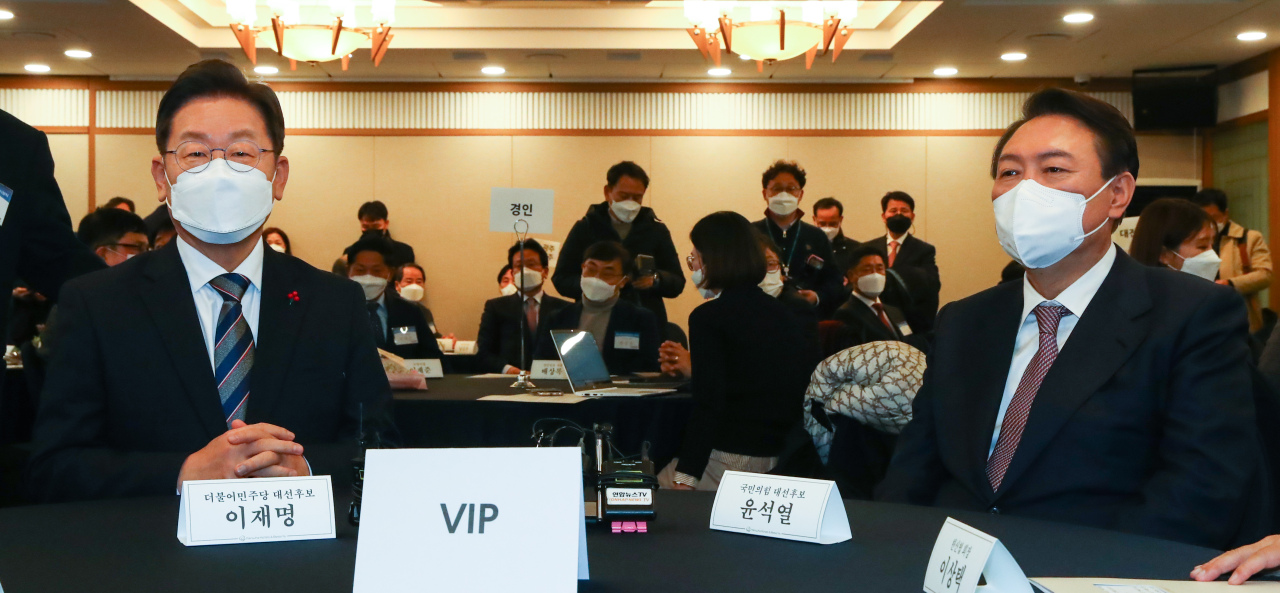 |
Lee Jae-myung, presidential nominee of the ruling Democratic Party of Korea, is seated at an award ceremony Monday next to his rival Yoon Suk-yeol, presidential nominee of the main opposition People Power Party. (Joint Press Corps) |
Whether to stage a televised debate or not is another topic being argued over between the two main contenders for South Korea’s upcoming presidential election, with no such event held so far with about 70 days left until the voting day.
Lee Jae-myung, presidential nominee of the ruling Democratic Party of Korea, has called for his rival Yoon Suk-yeol from the main opposition People Power Party to join him for a debate over policies and visions as the two are the main contenders in the ongoing race.
On Tuesday he went as far as to ask Yoon to join him in a series of weekly debates, saying whether a candidate is capable of providing stable and effective leadership with empathy can be gleaned from the way a candidate engages in debate and advocates for his or her policies.
"I sincerely ask the People Power Party and candidate Yoon Suk-yeol again. For the people to see for themselves and decide, I suggest holding a policy debate once every week," Lee said in an address for a TV program on Tuesday.
"Showing the people what policy moves would resolve the set of challenges before us and showing who is most competent for the task is the duty of candidates seeking to serve the people."
Yoon has been reluctant to participate in debates, which he views as riddled with unnecessary fights over words, operating under the assumption that debates are not effective in verifying the suitability of a candidate in an election.
"Participants are busy attacking others and defending themselves during debates, which deprives them of the chance to coherently share their own thoughts," Yoon said in an interview for a YouTube channel on Saturday.
"I believe it is best for viewers and experts to decide for themselves after candidates speak their minds. Debates only lead to fights, and I don’t think this helps from the eyes of the people in verifying the abilities of candidates before picking who to take the top administrative post."
Yoon criticized the usefulness of debate programs as a whole, hinting that not many people were interested in watching debates among People Power Party primary contenders even though the party held 16 such debates among its contenders from Sept. 16 to Oct. 31.
Lee rebutted that Yoon could be seen as defying democracy in opposing participation in the debates, as he believes politicians should not avoid dialogue with opponents as they represent the people in making policy moves or running campaigns.
"Politicians are required to listen to what stakeholders think, and politicians are responsible for presenting their philosophies and visions in request for agreement," Lee said in a Facebook post Monday.
"Refusing to debate by labeling it as a fight over words could easily be understood as announcing to distance oneself from democracy."
The Democratic Party added force to Lee’s calls for Yoon to meet him at debates, with lawmakers proposing a bill last week that increases the number of mandatory debates for presidential elections from the current three or more to at least seven.
Yoon said Monday he is willing to participate in debates as long as Lee accepts calls for a special counsel inspection on his possible involvement with the Daejang-dong land development scandal, adding that any debates before then are unnecessary before important questions are answered.
"Campaign promises and policy goals change as needed, and I am willing to accept calls for debate anytime as long as these changes are explained enough to be expectable," Yoon told reporters Monday. "But I believe that any debate in this situation is unnecessary."
Kim Chong-in, chief of Yoon’s election campaign committee, added weight in saying debates are not meaningful when only one side is eager to join. Presenting ideas coherently to the people is more important than the debate itself, he added.
"I think candidate Lee is mistaken for believing himself as a competent debater," Kim told reporters after an election campaign committee meeting Monday. "Debates are meaningful when the two sides are aligned, and we don’t have to follow calls for one just because of one-sided calls."
By Ko Jun-tae (
ko.juntae@heraldcorp.com)








